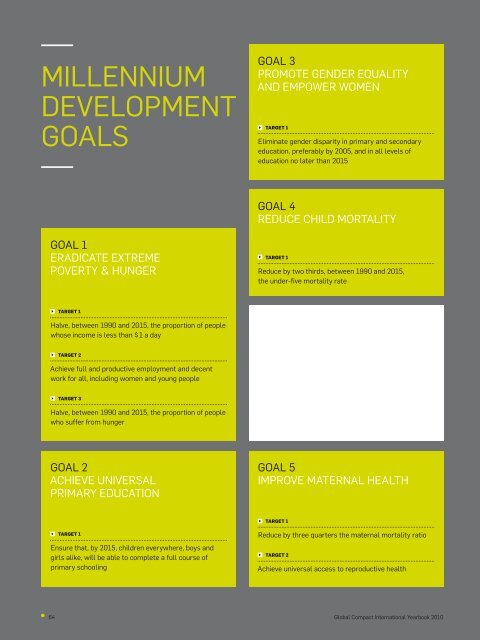Global Compact International Yearbook Ausgabe 2010
A profound retrospective of the first decade of the UN Global Compact, challenges in the light of the year of biodiversity, and instruments for an adequate Corporate Citizenship are some of the issues highlighted in the new 2010 edition of the “Global Compact International Yearbook”. Among this years prominent authors are Ban Ki-moon, Bill Clinton, Joschka Fischer and Achim Steiner. UN Secretary-General Ban Ki-moon said: “As the Global Compact enters its second decade, it is my hope that this Yearbook will be an inspiration to bring responsible business to true scale.” Formally presented during the UN Global Compact Leaders Summit in New York, the yearbook is now for sale. Looking back at the past ten years, the United Nations Global Compact has left its mark in a variety of ways, helping shape the conservation about corporate responsibility and diffusing the concept of a principle-based approach to doing business across the globe. Chapter two deals with Biodiversity: UNEP Executive Director Achim Steiner emphasizes the importance of protecting the nature: “Climate change has been described as the biggest market failure of all time – the loss of biodiversity and nature’s economically-important services must surely be running a close second, if not an equal first. Year in and year out, the world economy may be losing services from forests to freshwaters and from soils to coral reefs, with resulting costs of up to $4.5 trillion or more. Decisive action needs to be taken to reverse these declines or the bill will continue to climb – and with it any hopes of achieving the poverty-related Millennium Development Goals and a sustainable 21st century for six billion people, rising to nine billion by 2050.” Dr. Ahmed Djoghlaf, Executive Secretary of the Convention on Biological Diversity, adds: “Now is the time for concrete action from the business community to save life on earth. The alternative is an impoverished planet that can no longer support a healthy, vibrant global economy. The stakes in this fight could not be higher. As the slogan of the International Year reminds us, ‘Biodiversity is life. Biodiversity is our life.’”
A profound retrospective of the first decade of the UN Global Compact, challenges in the light of the year of biodiversity, and instruments for an adequate Corporate Citizenship are some of the issues highlighted in the new 2010 edition of the “Global Compact International Yearbook”. Among this years prominent authors are Ban Ki-moon, Bill Clinton, Joschka Fischer and Achim Steiner. UN Secretary-General Ban Ki-moon said: “As the Global Compact enters its second decade, it is my hope that this Yearbook will be an inspiration to bring responsible business to true scale.” Formally presented during the UN Global Compact Leaders Summit in New York, the yearbook is now for sale. Looking back at the past ten years, the United Nations Global Compact has left its mark in a variety of ways, helping shape the conservation about corporate responsibility and diffusing the concept of a principle-based approach to doing business across the globe.
Chapter two deals with Biodiversity: UNEP Executive Director Achim Steiner emphasizes the importance of protecting the nature: “Climate change has been described as the biggest market failure of all time – the loss of biodiversity and nature’s economically-important services must surely be running a close second, if not an equal first. Year in and year out, the world economy may be losing services from forests to freshwaters and from soils to coral reefs, with resulting costs of up to $4.5 trillion or more. Decisive action needs to be taken to reverse these declines or the bill will continue to climb – and with it any hopes of achieving the poverty-related Millennium Development Goals and a sustainable 21st century for six billion people, rising to nine billion by 2050.” Dr. Ahmed Djoghlaf, Executive Secretary of the Convention on Biological Diversity, adds: “Now is the time for concrete action from the business community to save life on earth. The alternative is an impoverished planet that can no longer support a healthy, vibrant global economy. The stakes in this fight could not be higher. As the slogan of the International Year reminds us, ‘Biodiversity is life. Biodiversity is our life.’”
Create successful ePaper yourself
Turn your PDF publications into a flip-book with our unique Google optimized e-Paper software.
MilleNnium<br />
Development<br />
Goals<br />
Goal 3<br />
PROMOTE GENDER EQUALITY<br />
AND EMPOWER WOMEN<br />
Target 1<br />
Eliminate gender disparity in primary and secondary<br />
education, preferably by 2005, and in all levels of<br />
education no later than 2015<br />
Goal 4<br />
REDUCE CHILD MORTALITY<br />
Goal 1<br />
ERADICATE EXTREME<br />
POVERTY & HUNGER<br />
Target 1<br />
Reduce by two thirds, between 1990 and 2015,<br />
the under-five mortality rate<br />
Target 1<br />
Halve, between 1990 and 2015, the proportion of people<br />
whose income is less than $ 1 a day<br />
Target 2<br />
Achieve full and productive employment and decent<br />
work for all, including women and young people<br />
Target 3<br />
Halve, between 1990 and 2015, the proportion of people<br />
who suffer from hunger<br />
Goal 2<br />
ACHIEVE UNIVERSAL<br />
PRIMARY EDUCATION<br />
Goal 5<br />
IMPROVE MATERNAL HEALTH<br />
Target 1<br />
Target 1<br />
Ensure that, by 2015, children everywhere, boys and<br />
girls alike, will be able to complete a full course of<br />
primary schooling<br />
Reduce by three quarters the maternal mortality ratio<br />
Target 2<br />
Achieve universal access to reproductive health<br />
64<br />
<strong>Global</strong> <strong>Compact</strong> <strong>International</strong> <strong>Yearbook</strong> <strong>2010</strong>

















